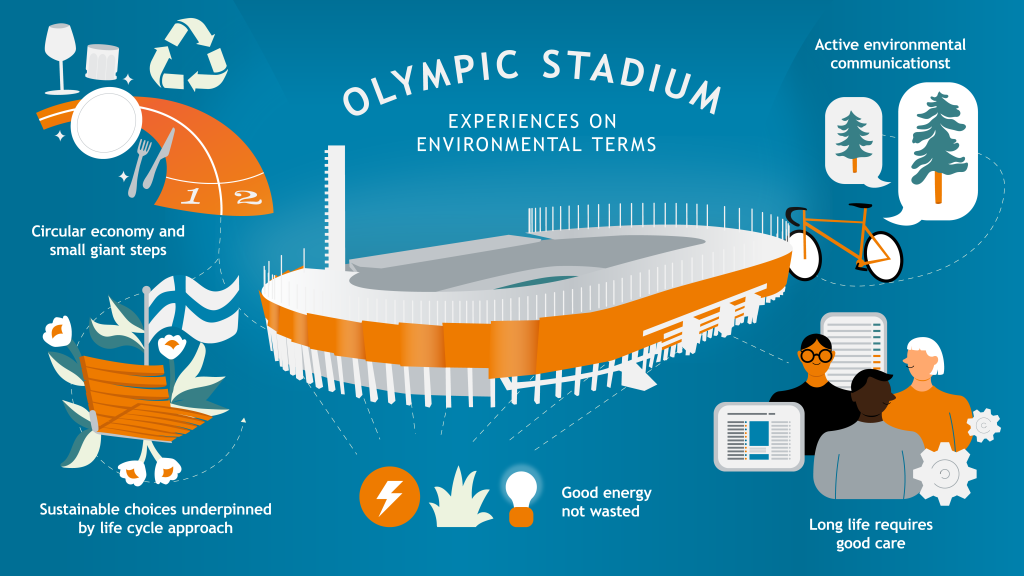Sustainability program
Actions and development in an environmentally conscious manner.
In order to learn more about responsibility, back in 2013 the Stadium Foundation that is in charge of the upkeep and maintenance of the Olympic Stadium joined EcoCompass, a practically oriented environmental management system with a focus on tangible actions developed jointly by the cities of Helsinki, Espoo and Vantaa. The EcoCompass project provided Stadium staff with a wealth of ideas on how to reduce the environmental impacts of events and the environmental load arising from the work carried out at the Stadium.
In December 2023, the Olympic Stadium management organisation, the Stadium Foundation, received the responsible tourism site label “Sustainable Travel Finland”, and the Foundation has made an Ecolabel commitment and made also an EU Ecolabel Environmental Certification Commitment, through which we are committed to promoting the use of official environmental labels through various actions.
The Olympic Stadium carries its responsibility for climate work in co-operation with City of Helsinki in order to reach the goals of the Carbon-neutral Helsinki 2030. Stadium have met also the Think Sustainably criteria.
Waste collection and reducing waste loads have been an area of emphasis in the rebuilding of the Olympic Stadium. The solutions used for the building, pitch and machinery are energy efficient.
Read more about the Olympic Stadium's environmental friendly solutions.
As concrete measures for our environmental program, we have chosen the following priorities:
- waste reduction, more efficient sorting and circular-economy
- guiding procurement in an environmentally friendly direction
- taking environmental issues into account in subcontracted products and services
- event-related actions in circular economy and environmental communication
Stadium Foundation was awarded Ecocompass's Ecolabel in December 2013 and 2024.
Stadium Foundation has fulfilled the following EcoCompass criteria:
1. The Foundation acts according to environmental laws and regulations.
2. The Foundation has its own environmental policy which forms the basis for the environmental goals.
3. The Foundation has organised an environmental assessment where the initial situation is charted and the most significant environmental impacts ensuing from the operations are assessed.
4. The Foundation prepares an environmental programme every year. The Foundation has goals which are based to reducing the essential environmental impacts.
5. The Foundation has appointed someone as responsible for environmental matters.
6. The key persons appointed by the Foundation for environmental issues take part in the environmental training provided by EcoCompass. The key persons instruct the rest of the staff to take environmental issues into account in their actions.
7. The company has a waste management plan. Waste is sorted at least according to the regional waste management regulations.
8. The Foundation records its hazardous waste, stores it safely and delivers it for due treatment.
9. The Foundation has a list of all chemicals used. Safety data sheets are available for the staff and the employees have been primed for the safe use of the chemicals. The Foundation stores its chemicals according to regulations.
10. The Foundation reports to EcoCompass every year about the outcome and fullfilment of goals and key ratios describing the Foundation's environmental actions. The monitoring report is available for the company’s staff.
The EcoCompass certificate demonstrates a commitment to continuously improving and complying with better tomorrow.EcoCompass is based both on the respective Nordic environmental management systems and on international standards on environmental management



























